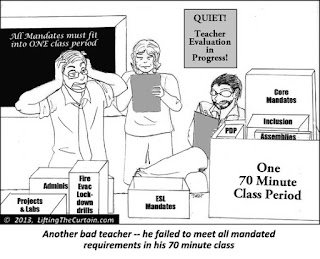Today I gave the school district "benchmark" tests in English III. These are designed to find out how much the students have learned so far this year.
Good luck with that.
Students dislike taking these tests as much as I dislike giving them. The first thing they want to know is if these tests will count for a grade. (Yes) Then they want to know how many questions there are on it. (63) Then they want to know why they have to take them along with the other tests we make them take. (Hard one to answer, but it comes down to knowing what we still need to learn.) Then they go about trying to sabotage the process.
This is what happens during 2nd hour.
Some, not all, just try to rush through as fast as they can. Some, like SR, just sit and groush. Of course, SR sits and kvetches about almost everything. I often wonder why she can't be more like SM who is continually bright and sunny most all of the time. (See, I told you that I'd put you in the blog.)
F keeps her phone out although she has been told that she has to put it away for the test. She acts as if she can't hear me, so I have to call for an administrator to takes her out of class. He brings her back about 5 minutes later. She is now contrite and will do what I say. She is one of the best at playing the Passive/Aggressive game.
FM comes in about 30 minutes late without a pass. When he finds out that I will assign him detention, he goes back and gets a pass marked "Excused." I think that he should be counted absent, but when I ask an administrator about it, he says that the excused pass excuses everything. He is not able to start the test, so he will have to start from the beginning tomorrow.
None of the students finish today, so we will have to do this again tomorrow.
3rd hour.
DC and ML keep their head on their desk all during the test despite all my efforts to get them to at least try and get started. The rest do pretty well because I let them know if they get at least 25 of the 63 questions done, they can get their beloved phones out and do whatever it is so vital for them to do for the rest of the hour.
I have had to resort to bribery.
4th hour goes well. That's the AP Language class
6th hour
This is very small class, and I would think I would have few problems with them. However, this is the class of my comedians. Particularly 3 boys who seem to go everywhere together. I call them, among other things, the 3 Amigoes, and sometimes Moe, Larry and Curly. (I have other trio names that I pull out from time to time.)
They more or less feed off of each other along with some of the girls in the class. Usually I just go with the flow, and we make it through the period in good spirits. However, when we need to buckle down and take things a bit more seriously, the hijinks get in the way.
Example, (from one of the girls), "Mr. Green, do boys get bloated?"
"Huh?"
"Do boys get bloated?"
"Mr. Green, she is asking if boys get gas."
"You need to do this test. It's important."
"Mr. Green, I am about to pass gas."
"Just go out into the hall, then."
"Okay."
Of course, by this time flatulence has become the topic of the day.
I get them through the exam okay, but I wonder how much "useful data" has been generated through all this.



































